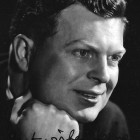Peter Glossop Suggest updates
Born Sheffield, 6 July 1928.
Died Rousdon, Devon, 7 September 2008.
English baritone.
Studies
Sheffield – He studied privately with Leonard Mosley and Eva Rich.
London – He studied with the former Carl Rosa baritone Appleton Moore and the tenor Joseph Hislop.
Performances of opera
Peter Glossop's stage debut took place in Sheffield in 1949 in a performance of The Tales of Hoffmann by the Sheffield Singers Operatic Society in which he sang two of the villains, Miracle and Coppélius. He worked as a bank clerk. After his move to London he joined the chorus at Sadler’s Wells in 1952. He made his professional solo debut as Moralès in 1953 and was employed as a principal baritone from then to 1962. His repertoire with the company included roles by Verdi (d’Obigny, Luna, Rigoletto), Puccini (Schaunard, Scarpia), and Bizet (Zurga, Escamillo). Other parts included the title role in Eugene Onegin, Gérard in Andrea Chénier, Guglielmo in Così fan tutte, and Krušina in The Bartered Bride. Most of these roles were sung during the company’s tours to Scotland under Alexander Gibson’s directorship.
His debut at Covent Garden came in 1961 as Demetrius in A Midsummer Night’s Dream. Other Britten roles included Balstrode (Peter Grimes) and Tarquinius (The Rape of Lucretia). He had great success in the title role of Billy Budd in the theatre, in a TV production conducted by Charles Mackerras, now available on DVD, and in Britten’s own recording in 1967. Later in his career he sang Lt Redburn in a revival of the same opera (when Thomas Allen had emerged in the title role. His Covent Garden repertoire also included Escamillo, Herald (Lohengrin), Donner (Das Rheingold), Jokanaan (Salome), Choroebus (The Trojans) and Don Giovanni. He was widely regarded as a Verdi specialist, singing the leading baritone roles in Nabucco, Macbeth, Rigoletto, Il trovatore, La traviata, Simon Boccanegra, Un ballo in maschera, La forza del destino, Don Carlos, Aïda, Otello and Falstaff. Other Italian performances at Covent Garden included Marcello in La Bohème, Michele in Il tabarro, Alfio (Cavalleria rusticana) and Tonio (Pagliacci).
Glossop had a major international career, singing regularly at La Scala from 1966. He also sang at the New York Met, and in Mexico City, San Francisco, Vienna, Berlin and most other leading houses. Herbert von Karajan invited him to the Salzburg Festival for Tonio and Iago, both performances being filmed, and Iago also recorded.
He came to Scottish Opera in 1963 for Iago in Otello and Ramiro in L’Heure Espagnole. He returned many times to perform Iago up until 1975. In 1982 he sang Scarpia in Scotland for the first time since the Sadler’s Wells tour of 1961. He also appeared at the Edinburgh Festival with the Covent Garden Company in 1961 (as Demetrius) and with the English Opera Group in 1963 (as Tarquinius).
He returned to Yorkshire in 1979 for the opening season of Opera North in Leeds, singing the title role in The Flying Dutchman, and revisited ENO in 1980 to perform Mandryka in Arabella. He retired in 1986.
Recordings
A souvenir of his Sadler’s Wells years exists in recordings of excerpts from Rigoletto and Il Trovatore made in 1961. He made a recording for EMI of Purcell’s Dido and Aeneas with Victoria de los Angeles and Sir John Barbirolli. He also appeared on a recording of Donizetti’s Roberto Devereux with Beverly Sills and Sir Charles Mackerras, and the Covent Garden recording of Les Troyens by Berlioz. His BBC recordings of the original versions of Verdi’s Macbeth and La forza del destino are now available from Opera Rara. Another excellent example of his work in Verdi appears on an Italian recording of Ernani, made with Montserrat Caballé, Bruno Prevedi and Boris Christoff. The Karajan Otello has been available in both the studio recording and in a live version with a slightly different cast. He appears on the 1964 recording of Il trovatore conducted by Carlo Maria Giulini which is now available in the Royal Opera’s Heritage series. An important non-operatic recording is the title role in Elgar's cantata Caractacus, with Sir Charles Groves.
Roles in Scotland
- Schaunard a musician
-
Bohème 1957
- Count di Luna a young noble of Aragon
-
Trovatore 1957
- Krušina a peasant
-
Bartered Bride 1957
- Marquis d' Obigny
-
Traviata 1957
- Marco Betto's son, aged forty-five
-
Gianni Schicchi 1957
- Giorgio Germont Alfredo's father
-
Traviata 1958
- Rigoletto a jester
-
Rigoletto 1959
Rigoletto 1962
- Escamillo a toreador
-
Carmen 1959
- Baron Scarpia Chief of Police
-
Tosca 1961
Tosca 1962
Tosca 1982
- Demetrius in love with Hermia
-
Midsummer Night's Dream 1961
- Ramiro a muleteer
-
Heure espagnole 1963
- Iago Otello's ensign
-
Otello 1963
Otello 1964
Otello 1967
Otello 1972
Otello 1975
- Tarquinius a Prince, son of King Tarquinius Superbus
-
Rape of Lucretia 1963

